Interviews
What sportsbook operators can do to better their odds with customer experience
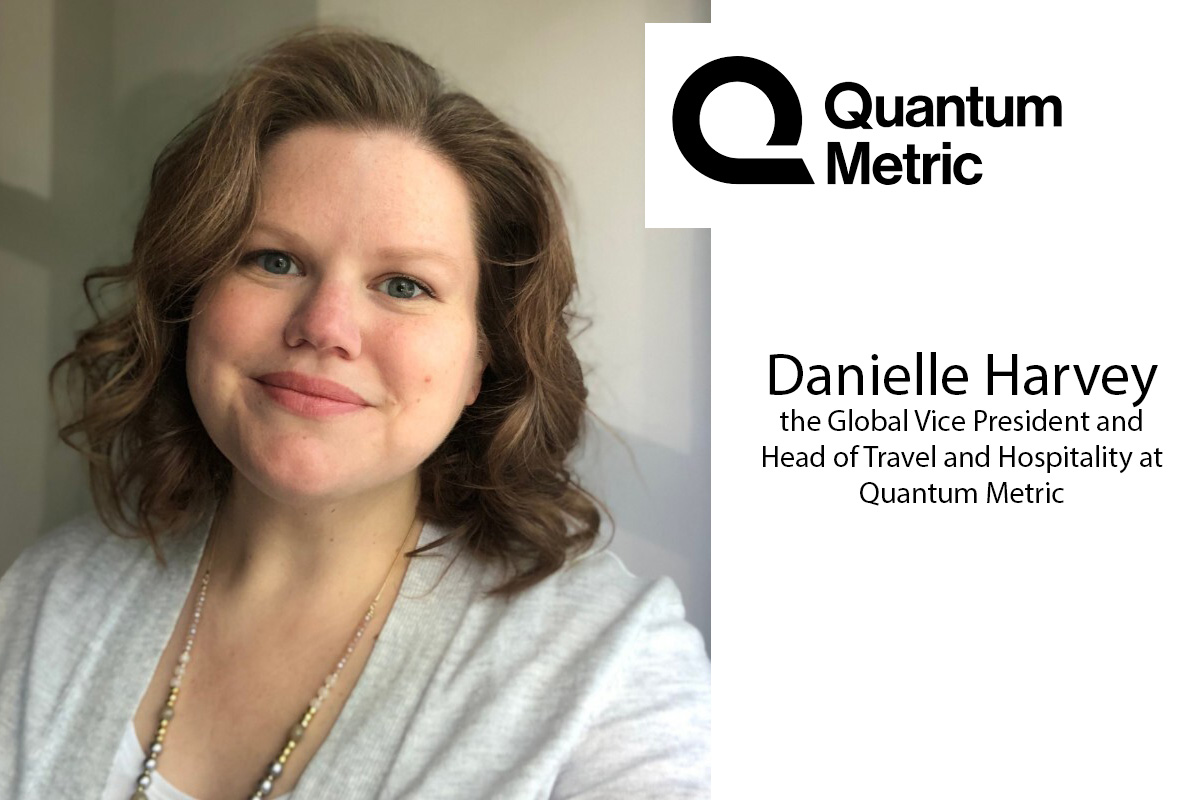
We sat down with, Danielle Harvey, the Global Vice President and Head of Travel and Hospitality at Quantum Metric, to discuss why sportsbook operators need to level up their online presence as mobile sports betting reaches new states.
As mobile sports betting becomes legal in more states, how do you see the market evolving, and what role does Quantum Metric play in helping sportsbook operators adapt to these changes?
As more states allow online sports betting, sportsbook operators will have to better prepare for the significant increases in the size of their potential market. There will be more changes in player behavior, given there are huge differences geographically in how bets are placed, and an increase in operators competing for a share of these new markets. In response, operators should specifically pay attention to behavior around promotions, as this is the biggest point of friction amongst new users as well as the easiest way to attract new players.
Personalization will also be pivotal in bringing new users to the platform. Rather than trying to optimize the happy path for the customer, operators are starting to think about how they use data to surface the content the user wants in the way they want to access it. This will be particularly important as new markets open in different states. Sportsbook operators need to act quickly on customer signals and make changes at the market level to improve the experience for those specific customers.
As the market expands there will be more state-specific regulations that will present significant challenges for operators. From varying deposit procedures and identification verifications to betting limitations, these differences can lead to disparate user experiences within the same platform across state lines. Quantum Metric is adept at aiding operators in fine-tuning these state-specific experiences, thereby reducing the costs and impacts of compliance on player conversion rates. By comparing friction points across states, Quantum Metric equips operators with actionable insights to streamline regulatory adherence while maintaining a user-centric focus.
Given Quantum Metric’s expertise in digital analytics, can you shed light on the most common challenges sportsbook operators face in delivering a seamless online experience to their users?
Promotions are where we see the most friction, especially when looking at new users there is a lot of confusion around free bets, and we see this with bet selection on top of post-bet around cash-out. Â Registration is also a huge focus when opening a new market, especially during big events like the annual Super Bowl.
For returning users, the most common challenge faced by operators is personalization. We are seeing a change in behavior and a shift in the customer wanting to create their own multi-level bet and have the operator return the odds for this in a responsive way.
Understanding the sports that individual bettors, as well as new markets are mostly interested in, can be a challenge too. Sports betting sites can seem very complex to new users and helping users access the content and bets that theyâre interested in will be critical. Ultimately, we are seeing operators use digital analytics to understand this and then optimize their experience accordingly. However, while personalization is still being refined, allowing the customer to configure their experience themselves could give operators the edge in the interim.
With numerous sportsbook operators entering the market, how crucial is it for brands to level up their online presence to maintain a competitive edge, and how does Quantum Metric assist in achieving this?
Having a robust online presence couldnât be more crucial as weâre starting to see regular sports bettors have accounts with around five operators. Quantum Metric helps level up the online presence of operators and ensure they maintain a competitive edge by capturing 100% of player experiences, allowing companies to see the issues that are impacting customers and in return, actually intervene when users are experiencing this friction.
There is no time to waste when it comes to online betting as customers wonât wait for a sportsbook to resolve the issue as timely sporting events often prevent gamblers from coming back the next day to place their bets. This is particularly important when it comes to in-play betting, so having an early warning system across the entire web and app experience will be crucial for retaining customers.
Quantum Metric is well established within customer service teams of operators since we allow agents to quickly understand the issues customers face. This not only allows companies to address customer queries quicker than they could have previously, but it also allows operators to focus on the issues that are driving users to the contact center.
How does Quantum Metric’s platform provide insights into user behavior, and why is this data invaluable for sportsbook operators looking to optimize their online platforms?
Quantum Metricâs 100% capture of user sessions and the depth of capture from OOTB metrics, events and errors alone allow companies to pinpoint issues that are impacting the customer experience in real-time.
Essentially, Quantum Metric has found that teams have very little visibility of the player on apps than from other tools. With the recent introduction of data enrichment, Quantum Metric can supplement our data with data from other sources which can let operators see the issues hurting the player experience through the lens of player tiers.
Since we know customers are likely to have accounts with multiple operators and will need to complete their transaction quickly, real time alerting is incredibly valuable, and Quantum Metric is being used as an early warning system for issues that are impacting customer experience. Quantum Metric can also connect players with CS teams when they are experiencing friction on key flows like deposit, registration or bet placement by triggering the launch of live chat based on signals observed. Similarly, we can surface VOC surveys to get feedback when users encounter friction which can allow operators to marry up the qualitative and quantitative datasets.
Quantum Metric has collaborated with major sportsbook brands. Can you share some success stories or key learnings from these partnerships that highlight the importance of a robust online presence?
Quantum Metric has been hugely valuable in identifying issues with API performance, particularly where API failures prevented bets from being placed. Our 100% capture has allowed sportsbook operators to confidently and quickly resolve problems that are impacting a niche cohort of users, which would otherwise be very difficult to spot when looking at overall bet placement or continuation rates.
Weâve also been adopted by the customer service teams of the operators to revamp customer experiences and resolve issues around key flows such as registration, KYC, promotions, deposits and withdrawals. As a result, our services to sportsbook operators have seen quicker resolutions for customers and increased user retention.
One notable success story involved a long-running spinner impacting deposits in a particular region for an operator Quantum Metric works with. By pointing out the error and by making the small change, the sportsbook operator was able to increase page conversion by 5% and reduce friction by 74% on the deposits page.
One success story involves BetVictor, one of Europeâs leading online gaming companies. Through our ongoing relationship, we helped the company optimize the bet slip experience and improve its customer feedback rate by providing data-driven insights. As a result of having increased visibility into its customer data, BetVictor saw session engagement rates rise rapidly and its bet slip funnel specifically saw a 3% increase in its conversion rates.
Looking ahead, what trends or innovations do you foresee in the mobile sports betting industry, and how is Quantum Metric positioning itself to support sportsbook operators in navigating these future developments?
A trend we have seen is around operators moving towards a place where the customer can create the exact bet they have in mind and where the operator can serve responsive odds. There has also been a rise in micro-betting for mobile, where players make rapid-fire, small bets during live games on changing lines and odds. As a result, Quantum Metric is ready to support operators with real-time analytics on live games and glean insights of this high-engagement betting style compared to traditional pregame betting.
Interviews
Review Fatigue Is Real: How to Make Casino Comparisons Clear, Honest, and Human

Sebastian Jarosch is the founder of Mithrillium Media Ltd, and a very famous figure in the iGaming industry. His contributions to the market have been immensely influential. Jarosch has overlooked several projects relating to the online gambling market, most notably those involving affiliates. Because of his past works, we believe he is uniquely qualified to address the topic of Review Fatigue, that seem to be plaguing the industry right now.
Actions speak louder than words. And Jaroschâs actions have earned him several of the most notable industry awards. Among the most notable are the Casinomeister 2020 Awards for Best Casino Group, the AskGamblers Awards for Best Partner in 2021, and the Affpapa Awards Affiliate Programme of the Year 2022.
Interview Questions:
What is âreview fatigue,â and why do you think itâs becoming a growing issue in the iGaming space?
Review fatigue happens when players are faced with repetitive, overly long, or generic content. With so many casinos offering similar bonuses, games, and licensing, users quickly lose interest if every review sounds the same. Many reviews lack real insight and simply list features without context, often sounding too good to be true. As a result, players tend to skim or move on entirely, especially if theyâve already seen the same structure and wording on multiple other sites.
How can overly technical or overly promotional content alienate users instead of helping them?
When content is too technical, it can confuse or intimidate newcomers. Ideally content is educational and written with the player in mind. On the flip side, a sales pitch feels dishonest, especially to experienced players who know what to look for. Users are looking for clarity and guidance, not marketing sugar coated casinos. If a review sounds like itâs trying to sell rather than help, it erodes trust immediately. Players want transparency, real pros and cons, not just buzzwords.
What are the most important things players want to see in a casino comparison, and what can we safely leave out?
Players want to know the promotions, payment methods, withdrawal speeds, licensing, game variety, and reliability of a casino. They also care about things like support quality, KYC, ownership, RTPs, and real player feedback. What they donât want is generic content that could apply to any casino and offers no real value. Sites like Casino-Groups help players pick the right casinos based on individual preferences.
How do you balance clarity with completeness when writing or designing reviews?
Itâs all about prioritizing information and guiding the reader. We aim to answer the most important user questions right at the beginning, often using summary tables to make things easier to digest. More detailed information comes later for those who want to dive deeper. Itâs important to avoid walls of text and explain complex terms in plain language. The goal is to give users exactly what they need to know, without bombarding them with unnecessary information.
Do players trust shorter, more digestible content more than long-form reviews today? Why or why not
Shorter content tends to convert better because users find what theyâre looking for quickly, without digging through long paragraphs full of filler. Dense, meaningful content with no waste often performs best. A short, clear, and well-structured review can build more trust than a long one filled with fluff. That said, some players do enjoy longer reviews, especially when theyâre broken up with visuals, clear sections, and genuinely useful insights.
What role does tone of voice play in making reviews feel more human and less âsalesyâ?
A review should feel like itâs written by a real person whoâs an expert in the field, not by ChatGPT or a salesperson. We use conversational language where possible and speak directly to the user. If somethingâs bad or a bonus is just average, it needs to be mentioned. That kind of honesty builds far more credibility than flashy design or empty buzzwords.
How do you verify and present information (e.g., licensing, terms, payment speed) in a way thatâs both accurate and user-friendly?
We manually verify everything by signing up, testing support, and reading the fine print. We also check licenses through official registries and monitor user feedback on watchdog sites. To present the information clearly, we use tables, lists, screenshots, and both internal and external links to relevant pages. All our reviews follow a consistent format so players know what to expect and can easily find the details they need.
Have you experimented with visual elements like comparison tables, badges, or rating meters to reduce cognitive load?
Pictures speak a thousand words and help break up content into smaller, more digestible sections, reducing review fatigue. We use comparison tables for things like bonus terms, game selection, and payment methods. Every review includes a rating, and we apply badges to highlight our top casinos. This makes it easier for users to compare options at a glance and make smarter decisions with less effort.
What strategies do you use to keep review formats consistent while still personalizing the experience for different user types?
We follow a consistent structure that works well for both SEO and conversions. However, if a specific area needs emphasis or additional context, weâre happy to deviate from our standard format to ensure topical completeness. Some casinos offer unique features that deserve extra attention, and in those cases, weâll add dedicated sections. The framework is consistent, but we stay flexible where it counts.
Looking ahead, how do you think casino reviews will evolve to meet changing user expectations and attention spans?
Weâll see more interactivity, personalization, and smarter use of data. Reviews could adapt in real time based on user preferences, highlighting crypto options for one user and game selection for another. AI chatbots may help users find the best match and answer questions about a casino instantly. Integration with platforms like Discord or Telegram where players can exchange themselves could also make reviews feel more social and trustworthy. Reviews need to become sharper, more authentic, and more genuinely helpful than ever before.
Interviews
Curated for impact: How Infingame is redefining games aggregation
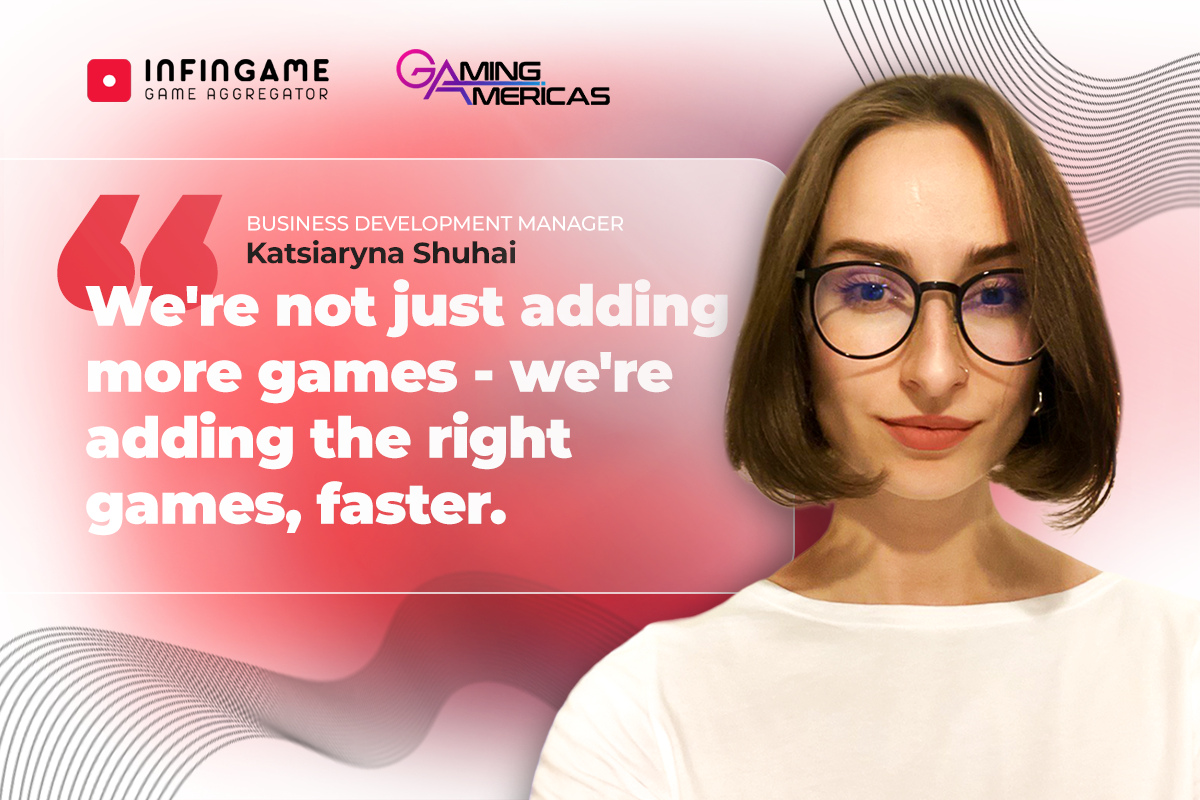
In an exclusive with Gaming Americas, Katsiaryna Shuhai, Business Development Manager at Infingame, explores how the supplierâs curated approach to casino content is redefining the games aggregation space.
Katsiaryna, can you begin by introducing yourself â what does your role at Infingame entail?Â
As the Business Development Manager at Infingame, I lead strategic partnerships and integrations with game studios and content providers. My role focuses on identifying standout gaming content that fits our platform’s vision, negotiating collaboration terms, and ensuring smooth onboarding.
With a background in advertising, I bring a strong focus on relationship-building, open communication and a personalised approach to each partner. I believe that genuine connections and tailored solutions are key to driving successful, long-term collaborations.
Infingame has recently integrated with innovative game studios, including TaDa Gaming and Popiplay. What factors influenced your decision to partner with these two studios in particular? How have they impacted your partners’ engagement and retention across Latin America?Â
Our decision to partner with TaDa Gaming and Popiplay was driven by each studioâs ability to deliver innovative, high-performing content that resonates with players across our key markets, including Latin America. Popiplay offers energetic, entertainment-led slots, while TaDa brings a diverse mix of popular formats such as crash and fishing games.
Weâre confident that these integrations will help our partners boost player engagement and retention, particularly in Brazil, Mexico, and Colombia. Both studios align perfectly with our goal of delivering meaningful and localised content.
With 16,000+ games from 200+ providers available via Infingameâs platform, how do you ensure that new titles donât just add volume but deliver real value to your operators?
While our platform boasts a vast library of games, we prioritise quality over quantity. Itâs important to deliver content that we know players will enjoy, rather than just sheer volume.
When adding new content to our platform, each new title undergoes a rigorous evaluation process to ensure it meets our standards for player engagement, technical performance and market relevance. By focusing on curated content that aligns with operator needs and player preferences, we ensure that every addition enhances the overall value proposition for our partners.
Infingame is now taking a much more curated approach to game studio integrations. What sparked this change in strategy?
The shift towards a more curated approach stems from our commitment to delivering tailored, high-quality content that meets the specific needs of our operators and players. We want to make sure that the games on our platform are suited to local player behaviours, technical requirements and localised to each individual market.
As the iGaming industry continues to evolve, and more markets begin to embrace gambling regulation, it’s essential to focus on partnerships that offer strategic value, ensuring that each integration contributes meaningfully to our platform’s objectives and enhances the user experience.
With more selective onboarding of game providers, how does Infingame evaluate which studios to integrate with? What criteria do you consider?
We evaluate potential game studio partners using a rigorous set of criteria to ensure quality and compatibility with the Infingame platform. Key factors include the uniqueness and quality of game content, with an emphasis on standout mechanics, visuals and immersive experiences. Technical reliability is absolutely crucial – we assess API stability, integration efficiency, and overall tech performance to guarantee seamless operations.
We also consider the studioâs reputation and regulatory compliance across our target markets, ensuring that they meet legal standards and industry expectations. A strong track record of player engagement and retention is another important indicator of long-term value.
Additionally, we look for a clear commitment to innovation, including new formats or features that enhance the player experience. This selective onboarding approach helps us maintain a diverse, high-performing game portfolio that supports our operator partners and meets the evolving demands of players worldwide.
How will this refined integration strategy impact your existing and prospective partners, particularly in terms of content diversity and speed to market?
This refined integration strategy empowers us to deliver greater value to both existing and prospective partners by emphasising quality over quantity. By curating a portfolio of high-performing, innovative content, we ensure that our partners can offer games that genuinely resonate with their target audiences and stand out in a crowded marketplace.
Our focus on onboarding only top-tier, reliable studios means partners benefit from diverse and engaging content that drives player retention and growth. Additionally, by streamlining technical integration and reducing operational friction, we can accelerate speed to market, enabling our partners to launch new titles more efficiently and capitalise on emerging trends.
This agility is key to maintaining a competitive edge. Ultimately, our strategy is designed to foster long-term success for our partners by delivering not just more games – but the right games, faster.
Finally, whatâs next for Infingame? Are there any upcoming partnerships, features, or innovations that you can give us a sneak peek of?
Looking ahead, Infingame is committed to expanding its portfolio through strategic partnerships with studios that deliver innovative, high-impact content. Our focus remains on curating games that not only entertain but also enhance player retention.
At the same time, we’re investing in new technologies and platform features – such as advanced tournament mechanics, real-time engagement tools, and personalised player experiences – to help our partners stay ahead of industry trends.
These enhancements are designed to drive deeper engagement, increase revenue potential, and strengthen the overall value we bring to our operator network as a trusted, forward-thinking iGaming aggregator.
Interviews
Sweepstakesâ next chapter: Exploring global potential, US regulations and player preferences
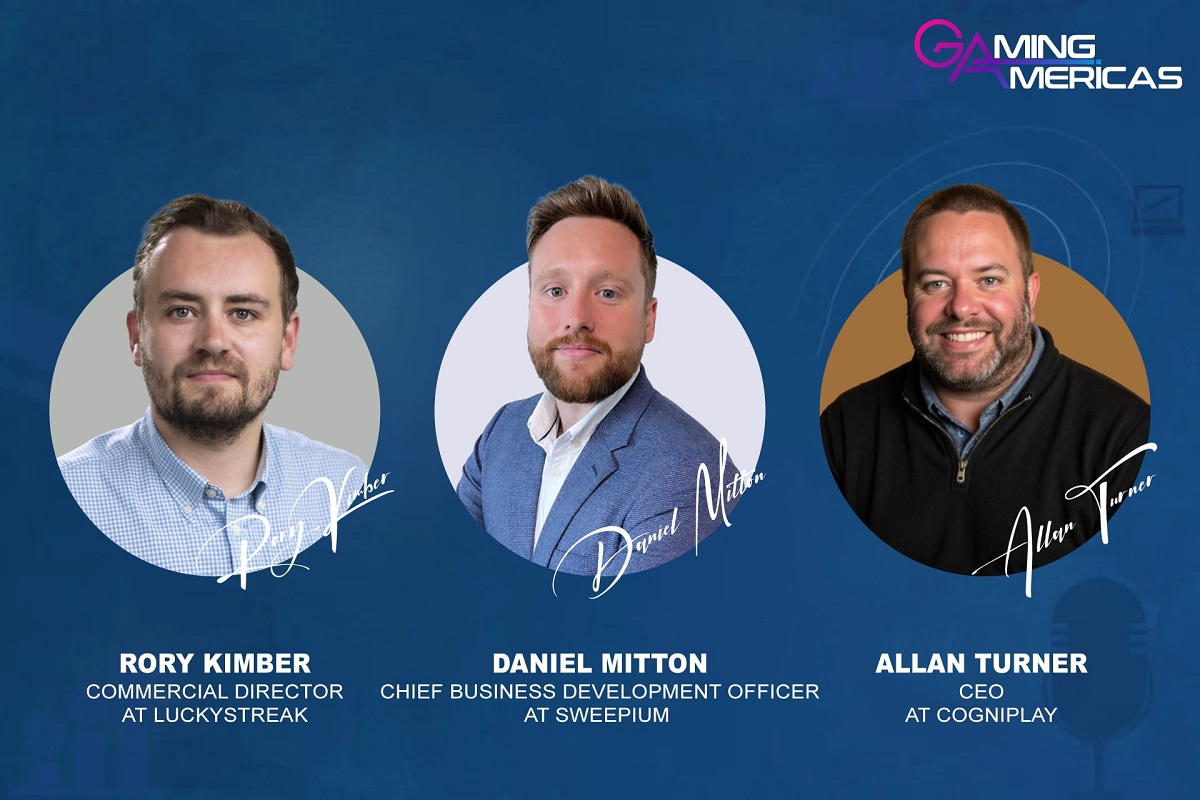
Sweepstake casinos have seemingly come out of nowhere to dominate the discourse across the US. We spoke to a number of providers who have entered the space to see what their expectations are, and how far the sweeps vertical can go alongside the traditional casino experience.
With/ Rory Kimber, Commercial Director at LuckyStreak, Daniel Mitton, Chief Business Development Officer at Sweepium and Allan Turner CEO at Cogniplay
Â
What games are best received by sweepstake customers? Traditional games or more gamified titles such as boosted multipliers or big jackpot games?
RK: I would say that for live dealer, itâs a traditional genre of games that are popular with sweepstakes casinos players, and as weâve seen, particularly Blackjack. US players are more likely to play in land-based casinos, so the authentic and human aspects of live dealer games naturally resonate well.
Weâve seen a big uptake of all our core games, which was gratifying, but thatâs not to say the gamification aspect doesnât play a role, as our leaderboards and tournaments are popular and very effective, particularly with this segment of players that are looking for more than just gameplay.
In slots it seems to depend on the brand; some operators bring in players who want traditional maths and features but an increasing number are seeing strong performance from new games with unique features that never lose your attention for a second. The providers that create games with sweepstakes players in mind will be more likely to see success.
AT: What weâre seeing is that players seem to lean towards games that feel quite traditional and familiar to them in most cases. Although, they often come with features like fixed jackpots that scale with your bet, which adds a bit more excitement to their playing experience. I would say that users are gradually getting more experimental over time, and as the prevalence of non-US based games providers increases on sweeps sites, with them applying the sweeps mechanic to their games, innovation is certainly speeding up, and this is being embraced by users.
DM: What weâre seeing from the U.S. audience is a clear preference for high-energy, feature-rich games. Titles that include interactive mechanics, boosted multipliers, or big-event style moments consistently drive the most engagement. These kinds of experiences are more immersive, more social and they give players a sense of momentum and excitement.
That said, traditional slots and classic-style games still play an important role especially as an entry point for new users. Over time, players really respond to content that feels fresh, dynamic and packed with surprises. It’s not just about spinning, it’s about participating in an entertainment experience.
Â
Do you tweak titles to be unique to sweepstake casinos, or does the same product respond well on traditional online casinos and social?
AT: Right now, we mostly work with studios to handle any tweaks, though in general, the classic versions of games tend to perform well across different platforms. One area that we do see more interest in the sweeps market, is in things like fishing and shooting-style games, which have a real captive audience in the US, due to the history of fish table games in the market. One tweak that a lot of brands are employing is asking their game providers to create branded games for them, which in a lot of cases tends to perform very well, particularly for the more well-known brands.
RK: We tweak our games to be compliant first and foremost, but in terms of the actual gameplay in the Live games, itâs pretty much the same.
For social casinos in particular, there are necessary changes because the number of coins people win can be enormous, so that requires some thought too. For slots, weâve seen our providers make sure the fastest gameplay settings are defaulted, along with all their features enabled that some regulated markets donât allow, but really a lot of the time the gameplay experience is comparable.
That being said, providers who build sweepstakes and social titles from the ground up do go about things in a different way and have those players front of mind throughout the development process and that has been successful.
DM: Weâve found that the core product translates well across both traditional online and sweepstakes platforms especially when it comes to high-quality, well-designed games. The fundamentals of engaging gameplay, strong visuals and smooth mechanics resonate just as strongly with sweepstakes players as they do in real-money or social environments.
That said, there are subtle but important differences in how players engage. In sweepstakes, we tend to see more interest in longer session times, progress-based features and community-driven elements, which slightly shifts how we position and present the content. For example, boosted multipliers and timed events do especially well in the sweeps format because they align with that desire for ongoing entertainment and personal achievement.
Ultimately, a strong core game can succeed in both spaces. It’s about making the right adjustments to match player expectations keeping the experience fresh and engaging.
Â
Do you think sweeps will become as popular throughout Europe as they are in the US?
RK: I think the elephant in the room is regulation. Sweepstakes are a popular product but are inextricably linked to what local regulation allows. For European markets where the real money industry has experienced stringent regulations I believe there is a space for sweepstakes casinos to come in and give players an experience more comparable to what they enjoyed a few years ago. Iâm no expert on the legalities of sweeps in each of these jurisdictions but Iâd be very surprised if they donât gain a foothold in the European market somewhere.
DM: Thereâs definitely potential but the dynamics are different. In the U.S., the appeal of sweepstakes is closely tied to accessibility and the ability to engage across most of the country, on a state by state basis. Thatâs given the model a unique edge in the U.S. market.
In Europe, where the digital entertainment and gaming landscape is already well-established, the path might look different but I do think thereâs room for growth, especially in areas where lightweight, low-barrier gaming experiences are in demand. The key will be localization, cultural relevance and regulatory framework. The model works best when it speaks directly to the habits and preferences of each market.
AT: Personally, I think itâs all about how market conditions change in Europe in the coming years, particularly with regards to regulation. In the US sweeps has become particularly popular because it has filled the void left by the fact there are still so few regulated states for real-money gaming. Does this void exist in Europe in the same way? Well, no, not in most countries, not now anyway. However, should regulators continue their current path to over-regulation, who knows how that will end up. There are already several sweepsâ sites operating in a few European markets, that are already quite over-regulated, and that trend could well continue apace.
Â
Sweepstake casinos have shot to popularity in a swift time frame. Where do you think theyâll be in 5 yearsâ time?
AT: This is the billion-dollar question on everyoneâs lips right now, with regards to sweeps, itâs certainly a question we get asked a lot! Obviously, there is a lot of noise about sweeps at the moment, and a huge number of variables to consider, and itsâ anyoneâs guess how it will all turn out in the end. Ultimately there is a huge demand in the US for online gaming products, and it seems logical, as part of free market economic theory that unless regulated gaming can progress much more quickly than it is now.
RK: Well again the obvious answer is what US regulators do – both in terms of the speed of opening up new states to online casinos, to how they respond to the growth of the sweepstakes sector. If things carry on largely the same I can see sweepstakes being at a similar level in terms of market share, perhaps even growing as more providers and new operators enter the market and improve the product offering.
I think overall it will be a balance, as certain areas in the US close off sweepstakes, other markets round the world will open up, so I see a steady path ahead on a global level – although perhaps not a repeat of the explosion weâve just witnessed. Social is a different kettle of fish: I believe it will continue to grow rapidly and become linked in more interesting ways with the acquisition activities and loyalty programmes of real money gambling companies, whether they be land based or online.
DM: Looking five years ahead, I see sweepstakes platforms evolving into full-scale entertainment hubs. The future isnât just about gameplay, it’s about creating connected, content-rich environments that bring together digital experiences, creator-driven events and community engagement.
Weâre building platforms where people donât just come to play, they come to interact, explore and be part of a larger digital culture. That could mean live-hosted experiences, interactive tournaments or even crossovers with music, sports or media. The sweepstakes format is incredibly flexible and that gives us the ability to adapt fast and scale with the culture. In short, weâre not just part of the digital entertainment world, we’re helping shape where itâs going next.
-

 partnerships7 days ago
partnerships7 days agoInternational Gaming Standards Association Welcomes New Payments Committee Member: Sightline Payments
-

 Latest News7 days ago
Latest News7 days agoFBMÂŽ unveils golden treasures in Mexico with Crocâs Lock⢠bites
-

 Compliance Updates7 days ago
Compliance Updates7 days agoHonolulu Mayor Signs New Laws Targeting Illegal Game Rooms
-

 eSports6 days ago
eSports6 days agoBETBY EXPANDS LATAM FOOTPRINT WITH MOBADOO ESPORTS PARTNERSHIP
-

 Latest News7 days ago
Latest News7 days agoAGS Named One of U.S. News & World Reportâs 2025â2026 Best Companies to Work For
-
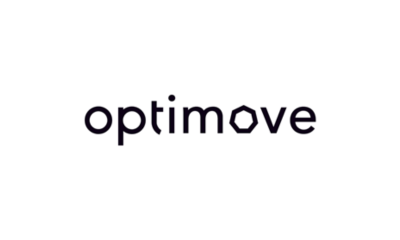
 Latest News5 days ago
Latest News5 days agoOptimove and EveryMatrix Launch Real-Time Integration to Power Smarter Marketing for iGaming Operators
-
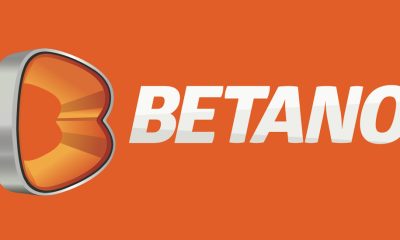
 Latest News5 days ago
Latest News5 days agoBetano, Official Sponsor of CONMEBOL Copa AmĂŠrica Femenina 2025â˘
-

 Latest News5 days ago
Latest News5 days agoSpotlight 29 Casino and Tortoise Rock Casino to Launch Konami Gamingâs SYNKROS Casino Management System




